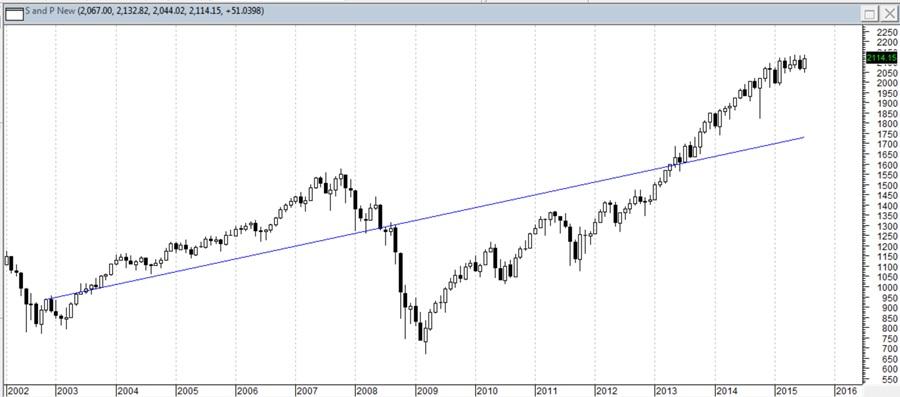Outlook:
Another cliffhanger is developing in Greece. It’s entirely possible that the Greek deal for a third bailout, complete with one bridge loan, will still fail because the Greek parliament is judged unwilling to tax farmers the same as everyone else and Tsipras removed that requirement from the bills just passed overnight. But the creditors demand it. Full compliance is needed by Aug 7 to allow time for disbursement ahead of a €3.2 billion payment to the ECB on Aug 17. But parliament will be thinned out by a third in Aug (heaven forbid anything interfere with holidays) and Tsipras doesn’t have the votes. This is more than a sticking point—it speaks to the culture of preferential treatment, general avoidance of taxes and citizens lying to the government. We no doubt have plenty of “farmers” in the US—we still have a splendid Christmas tree farm scam—but it’s not endemic. When it comes to Greece, if anything can go wrong, it will.
In the US, the bond market is starting to prepare for the Fed rate hike, whether September or postponed to later. We hope to get a clue or two at next week’s FOMC. Market News reports the chief form the preparation takes is curve flattening—“Both the 2/10-year (to +161.2 bps) and the 5/30-year curve (to about +137.2 bps) flattened about 4 more basis points. The longer end of the curve did better due to the usual culprits: lower oil, falling stocks, Greece concerns, looming month end buying needs and less cor-porate supply.”
The FT notes that in addition to preparatory flattening, there is a seasonal effect—net bond supply falls in the summer. BoA/ML says that since 2000, “bond yields in the US, eurozone and the UK are between 20-25 per cent more likely to fall in July and August than any other months.”
Market News reports the Citibank July Interest Rate Survey, which contains some bizarre findings: about 60% expect Fed lift off in September, up from 50% in June but nowhere near the 80%+ the WSJ survey finds. And about 60% expect another three Fed hikes in the 12 months following the first hike. Three! This means, among other things, that the survey respondents did not hear Yellen say, re-peatedly, that the pace of hikes will be gradual, gradual, gradual. In the UK, the BoE is saying the same thing—the trajectory will be low. What’s going on—do the bond boys see more inflation coming down the pike than anyone else? Why do they not believe the Fed?
Just in time, the WSJ reports a new paper from Harvard economists Jeremy Stein (former Fed Gov) and Adi Sundaram that says the Fed should stop paying attention to the bond market. It inhibits the Fed’s ability to operate. “It can be valuable for a central bank to develop an institutional culture and set of norms such that a concern with bond-market volatility does not play an outsized role in policy delibera-tions. In other words, it can be useful for monetary policymakers to build a reputation for not caring too much about the bond market.”
While the dollar is undergoing a correction, having gotten horribly overbought, it’s hard to see the effect of upcoming rate hikes. But we all know what those effects are—outflows from emerging market cur-rencies, etc. It’s an odd world in which the Reserve Bank of New Zealand is cutting rates and will cut again, probably in Sept, as the Fed is raising them. In fact, the US and UK are out all alone in the rising-rate mode. As noted before, the IMF wants the US to stay its hand until next year, although we think we heard Yellen decline to overweight external developments. A good crisis might do, though.
Another thing we think we know is that the advent of a tightening cycle is not necessarily death to equi-ties. The last time—end-June 2004—the S&P rose 7.2% in the ensuing 6 months. Okay, it fell over 3% in the first month, but then it recovered. And we all know what came next—an unprecedented rally, interrupted by the Great Recession crisis. See the chart.
We continue to think normalization is a wonderful thing that can’t come soon enough. For FX purposes, we should probably expect that normalization is already largely priced in but not fully priced in. We keep getting asked whether the euro will revisit 1.0500 or parity as forecast when tapering was announced. The answer is yes. Now we just need the bond market to start agreeing and that yield spread to widen back to a fat premium for the dollar. In the meanwhile, enjoy the euro correction while it lasts.
Note to Readers: We will not publish any reports the week of Aug 3-7. Cape Cod beckons.
This morning FX briefing is an information service, not a trading system. All trade recommendations are included in the afternoon report.
Recommended Content
Editors’ Picks

USD/JPY pops and drops on BoJ's expected hold
USD/JPY reverses a knee-jerk spike to 142.80 and returns to the red below 142.50 after the Bank of Japan announced on Friday that it maintained the short-term rate target in the range of 0.15%-0.25%, as widely expected. Governor Ueda's press conference is next in focus.

AUD/USD bears attack 0.6800 amid PBOC's status-quo, cautious mood
AUD/USD attacks 0.6800 in Friday's Asian trading, extending its gradual retreat after the PBOC unexpectedly left mortgage lending rates unchanged in September. A cautious market mood also adds to the weight on the Aussie. Fedspeak eyed.

Gold consolidates near record high, bullish potential seems intact
Gold price regained positive traction on Thursday and rallied back closer to the all-time peak touched the previous day in reaction to the Federal Reserve's decision to start the policy easing cycle with an oversized rate cut.

Ethereum rallies over 6% following decision to split Pectra upgrade into two phases
In its Consensus Layer Call on Thursday, Ethereum developers decided to split the upcoming Pectra upgrade into two batches. The decision follows concerns about potential risks in shipping the previously approved series of Ethereum improvement proposals.

Bank of Japan set to keep rates on hold after July’s hike shocked markets
The Bank of Japan is expected to keep its short-term interest rate target between 0.15% and 0.25% on Friday, following the conclusion of its two-day monetary policy review. The decision is set to be announced during the early Asian session.

Moneta Markets review 2024: All you need to know
VERIFIED In this review, the FXStreet team provides an independent and thorough analysis based on direct testing and real experiences with Moneta Markets – an excellent broker for novice to intermediate forex traders who want to broaden their knowledge base.
